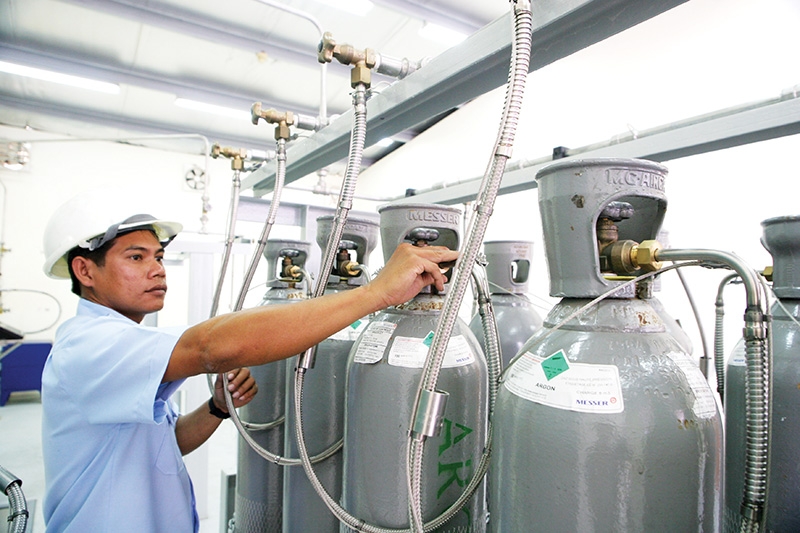Sharpened appeal to lure German interest
 |
| The new deal knocks down barriers and opens up markets |
German technical adhesive tape maker tesa SE is planning to build a €55 million ($65 million) factory in Vietnam in an effort to expand its production from 2023. The new facility will be located over 70,000 square metres at DEEP C Industrial Zones in the northern city of Haiphong.
“The new plant in Vietnam creates the necessary capacity to ensure our growth targets in the largest and fastest-growing region,” explained Stefan Schmidt, head of tesa’s Supply Network, which is responsible for purchasing, logistics, and production for the group worldwide.
Schmidt said that time-to-market is especially vital to tesa. “Access to markets, fast and flexible delivery to customers, and the development of local raw materials are important factors in international competition,” he added.
Vietnam offers tesa the best opportunities to shorten the route to customers and suppliers in Southeast Asia and China. Plus, Schmidt explained, a growing number of their important customers in automotive and electronics are relocating to Vietnam.
Marko Walde, chief representative of the Delegation of German Industry and Commerce in Vietnam, said that the newly-enforced EU-Vietnam Free Trade Agreement (EVFTA) will boost the economic growth of the country and attract more investors like tesa. German and international companies are set to enjoy protection of investment with trade facilitation in Vietnam thanks to the deal.
The elimination of bilateral tariffs and export taxes, together with the reduction of non-tariff barriers affecting the cross-border exchange of goods and services, are expected to boost bilateral trade considerably and create new openings for markets across a range of sectors covering goods, services, and investment for German companies. This is particularly true in automotives, green energy, electronics, IT, food processing, healthcare, education, and vocational training.
“For the long-term expectation, we hope German and European investors will increase investments in Vietnam based on the improved conditions here,” Walde said. “We strongly believe that there will be strong foreign investment flows into high-value projects in Vietnam, including from Germany. There are currently a lot of expansion plans involving German enterprises moving from China to Vietnam. They are complementing their existing Chinese operations with new activities in Vietnam regarding sourcing and investments.”
“The manufacturing site for tesa in Haiphong, for example, will take on about 140 employees,” Walde confirmed.
German software corporation SAP is also keen on the Vietnamese market. Josephin Galla, managing director of SAP Vietnam said that the country is one of SAP’s fastest-growing markets in ASEAN. SAP has been in Vietnam for 10 years and has gained the trust of over 500 customers across various industries. Moving forward, the company has a clear vision to power a digital Vietnam and support as many new and existing customers as it can.
Meanwhile, according to Guru Mallikarjuna, managing director of Bosch Vietnam, Vietnam’s resilient efforts in containing the current pandemic, coupled with the fact that trade agreements such as the EVFTA are officially in effect, will prove to be advantageous in increasing the country’s competitiveness. German companies are also presented with the opportunity to invest in research and development (R&D), as well as tech transfer. Bosch Vietnam, through its strong investment in R&D, connected manufacturing, and Internet of Things, is committed to bringing quality products and solutions to the market, which ultimately improves the country’s business landscape as well as quality of life.
To further facilitate trade and business operation under the EVFTA, digitalisation can be further embedded in industry application through automation and operation optimisation using data analysis, according to Bosch’s Mallikarjuna. This would help to significantly increase the productivity of Vietnamese factories and of the economy in general.
He added that in 2019, Bosch Vietnam announced its plan to invest €86 million ($100 million) to expand its factory in Vietnam within the next five years. In 2018, the firm established a regional hub for its two-wheeler and power sports division in Vietnam to address the fast-growing two-wheeler market in Southeast Asia.
As of July 20, Vietnam attracted 370 German investment projects registered at over $2 billion.
What the stars mean:
★ Poor ★ ★ Promising ★★★ Good ★★★★ Very good ★★★★★ Exceptional
Themes: EVFTA & EVIPA
Related Contents
Latest News
More News
- Hermes joins Long Thanh cargo terminal development (February 04, 2026 | 15:59)
- SCG enhances production and distribution in Vietnam (February 04, 2026 | 08:00)
- UNIVACCO strengthens Asia expansion with Vietnam facility (February 03, 2026 | 08:00)
- Cai Mep Ha Port project wins approval with $1.95bn investment (February 02, 2026 | 16:17)
- Repositioning Vietnam in Asia’s manufacturing race (February 02, 2026 | 16:00)
- Manufacturing growth remains solid in early 2026 (February 02, 2026 | 15:28)
- Navigating venture capital trends across the continent (February 02, 2026 | 14:00)
- Motivations to achieve high growth (February 02, 2026 | 11:00)
- Capacity and regulations among British areas of expertise in IFCs (February 02, 2026 | 09:09)
- Transition underway in German investment across Vietnam (February 02, 2026 | 08:00)

 Tag:
Tag:




















 Mobile Version
Mobile Version